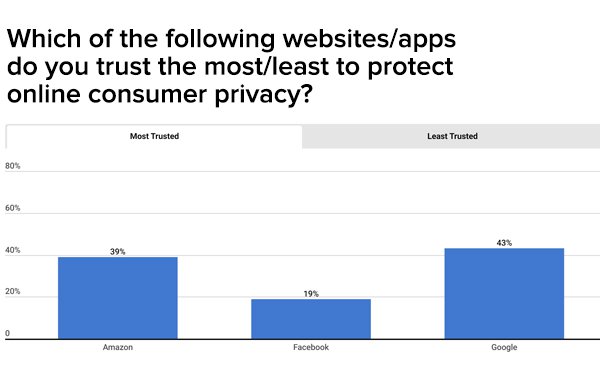How U.S. Consumers Really Think About Online Privacy
- by Laurie Sullivan @lauriesullivan, April 21, 2023

Tinuiti found that 88% of respondents to its recent survey believe technology powered by artificial intelligence will heighten privacy concerns in the future.
The findings from the third annual privacy study looked at attitudes that shape online behavior and preferences surrounding online privacy. It is based on responses from 1,000 U.S. consumers.
More than 70% of respondents to the study said they would prefer to opt out of tracking and receive less relevant ads than to allow tracking and receive more relevant ads.
About 57% of those surveyed say they would be okay with advertisers being able to see that they made a purchase on an advertiser’s website or app after seeing or clicking on an ad if it helped to keep the apps free from costs to use.
Nearly one-third of respondents chose criminals as the group they were most concerned would misuse data collected from online activity, followed by the government. Advertisers came in a distant third, with just 12% of respondents selecting this group.
All generations said they were most concerned about criminals, but just 25% of Gen Z made it their top choice compared to 45% of baby boomers.
Gen Z was disproportionately concerned about employers and tech companies compared to baby boomers.
Not many consumers were familiar with privacy legislation. Just 12% of respondents said that they were very familiar with recent legislation related to online privacy, and 47% said they were not at all familiar with such legislation.
Gen Z was most likely to say they were familiar with recent privacy legislation, with 65% saying they were at least somewhat familiar, compared to 36% of baby boomers.
Tinuiti supports advertising across Google, Meta, and Amazon. When asked to rank these platforms based on how much they trust them to protect online consumer privacy, 43% of respondents chose Google as the best, followed by 39% citing Amazon.
Facebook fared the worst, with just 19% selecting it as the best of these three, which is likely tied to its status as the only one of the three platforms designed for sharing information publicly.
Google and Amazon won for the most trusted search engine and marketplace, respectively, with each capturing more than 40% of respondents’ votes.
Among marketplaces, Amazon was a top pick across generations with 43% of Gen Z choosing it, compared with 41% among baby boomers. Target saw a much broader range in results, coming in as the top pick for 17% of Gen Z, but just 4% of Boomers.
Some 15% of respondents said DuckDuckGo was the best search engine for protecting privacy, even though only 7% reported that they use DuckDuckGo at least monthly.
Among those that do use DuckDuckGo monthly, the smaller search engine was the top pick for 58% of respondents, with Google still getting 22% support.
Across generations, DuckDuckGo’s strongest showing was among boomers, 23% of whom made it their top pick.
When asked how important are online data privacy considerations when buying a mobile phone, 48% said very important, 30% said somewhat important, 16% said most important, and 5% said not at all important.
For both iOS and Android, a majority of daily internet users said these mobile operating systems improved their privacy protection in the past year compared with previous years.
About 55% of respondents chose iOS as the mobile operating system that best protects consumer data privacy, compared to 34% who selected Android, as Apple’s efforts to promote itself as a privacy protector appears to have had an impact over the years on public perception.


